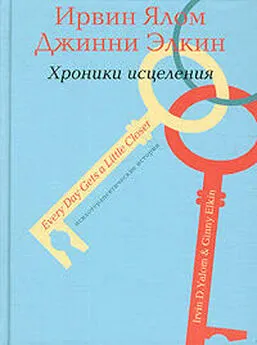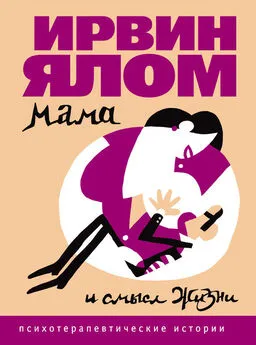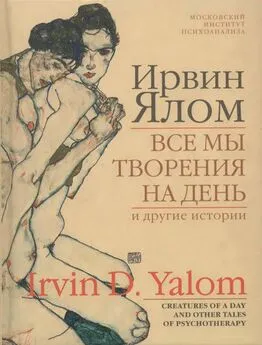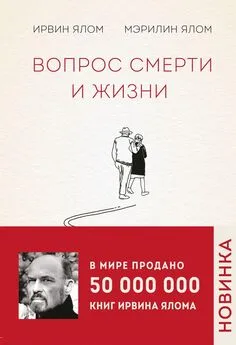Ирвин Ялом - The Schopenhauer Cure
- Название:The Schopenhauer Cure
- Автор:
- Жанр:
- Издательство:неизвестно
- Год:неизвестен
- ISBN:нет данных
- Рейтинг:
- Избранное:Добавить в избранное
-
Отзывы:
-
Ваша оценка:
Ирвин Ялом - The Schopenhauer Cure краткое содержание
The Schopenhauer Cure - читать онлайн бесплатно полную версию (весь текст целиком)
Интервал:
Закладка:
and philosophy.
Arthur`s father, Heinrich, was tormented by his son`s interests. The headmaster of
Arthur`s school had informed him that his son had a passion for philosophy, was
exceptionally suited for the life of a scholar, and would do well to transfer to a
gymnasium which would prepare him for the university. In his heart, Heinrich may have
sensed the correctness of the schoolmaster`s advice; his son`s voracious consumption and
comprehension of all works of philosophy, history, and literature in the extensive
Schopenhauer library was readily apparent.
What was Heinrich to do? At stake was his successor, as well as the future of the
entire firm and his filial obligation to all his ancestors to maintain the Schopenhauer
lineage. Moreover, he shuddered at the prospect of a male Schopenhauer subsisting on
the limited income of a scholar.
First, Heinrich considered setting up a lifelong annuity through his church for his
son, but the cost was prohibitive; business was bad, and Heinrich also had obligations to
guarantee the financial future of a wife and daughter.
Then gradually a solution, a somewhat diabolical solution, began to form in his
mind. For some time he had resisted Johanna`s pleas for a lengthy tour of Europe. These
were difficult times; the international political climate was so unstable that the safety of
the Hanseatic cities was threatened and his constant attention to business was required.
Yet because of weariness and his yearning to shed the weight of business responsibilities,
his resistance to Johanna`s request was wavering. Slowly there swiveled into mind an
inspired plan that would serve two purposes; his wife would be pleased, and the dilemma
of Arthur`s future would be resolved.
His decision was to offer his fifteen–year–old son a choice. «You must choose,” he
told him. «Either accompany your parents on a year`s grand tour of all of Europe or
pursue a career as a scholar. Either you give me a pledge that on the day you return from
the journey you will begin your business apprenticeshipor forego this journey, remain in
Hamburg, and immediately transfer to a classical educational curriculum which will
prepare you for the academic life.»
Imagine a fifteen–year–old facing such a life–altering decision. Perhaps the ever–pedantic Heinrich was offering existential instruction. Perhaps he was teaching his son
that alternatives exclude, that for every yes there must be a no. (Indeed, years later Arthur
was to write, «He who would be everything cannot be anything.»)
Or was Heinrich exposing his son to a foretaste of renunciation, that is, if Arthur
could not renounce the pleasure of the journey, how could he expect himself to renounce
worldly pleasures and live the impecunious life of a scholar?
Perhaps we are being too charitable to Heinrich. Most likely his offer was
disingenuous because he knew that Arthur would not, could not, refuse the trip. No
fifteen–year–old could do that in 1803. At that time such a journey was a priceless once–in–a–lifetime event granted only to a privileged few. Before the days of photography,
foreign places were known only through sketches, paintings, and published travel
journals (a genre, incidentally, that Johanna Schopenhauer was later to exploit
brilliantly).
Did Arthur feel he was selling his soul? Was he tormented by his decision? Of
these matters history is silent. We know only that in 1803, in his fifteenth year, he set off
with his father, mother, and a servant on a journey of fifteen months throughout all of
western Europe and Great Britain. Adele, his six–year–old sister, was deposited with a
relative in Hamburg.
Arthur recorded many impressions in his travel journals written, as his parents
required, in the language of the country visited. His linguistic aptitude was prodigious;
the fifteen–year–old Arthur was fluent in German, French, and English and had working
knowledge of Italian and Spanish. Ultimately, he was to master a dozen modern and
ancient languages, and it was his habit, as visitors to his memorial library have noted, to
write his marginal notes in the language of each text.
Arthur`s travel journals offer a subtle prefiguring of interests and traits which were
aggregating into a persistent character structure. A powerful subtext in the journals is his
fascination with the horrors of humanity. In exquisite detail Arthur describes such
arresting sights as starving beggars in Westphalia, the masses running in panic from the
impending war (the Napoleonic campaigns were incubating), thieves, pickpockets, and
drunken crowds in London, marauding gangs in Poitiers, the public guillotine on display
in Paris, the six thousand galley slaves, on view as in a zoo, in Toulon doomed to be
chained together for life in landlocked naval hulks too decrepit to put out to sea ever
again. And he described the fortress in Marseilles, which once housed the Man in the Iron
Mask, and the black death museum, where letters from quarantined sections of the city
were once required to be dipped into vats of hot vinegar before being passed on. And, in
Lyon, he remarked on the sight of people walking indifferently over the very spot where
their fathers and brothers were killed during the French Revolution.
At a boarding school in Wimbledon where Lord Nelson had once been a student in
England, Arthur perfected his English and attended public executions and naval
floggings, visited hospitals and asylums, and walked by himself through the massive
teeming slums of London.
The Buddha as a young man lived in his father`s palace, where the common lot of
mankind had been veiled from him. It was only when he first journeyed outside of his
father`s palace that he saw the three primal horrors of life: a diseased person, a decrepit
old man, and a corpse. His discovery of the tragic and terrible nature of existence led the
Buddha to his renunciation of the world and the search for a relief from universal
suffering.
For Arthur Schopenhauer, too, early views of suffering profoundly influenced his
life and work. The similarity of his experience to that of the Buddha was not lost on him,
and years later, when writing about his journey, he said, «In my seventeenth year, without
any learned school education, I was gripped by the misery of life, just like Buddha in his
youth, when he saw sickness, pain, aging, and death.»
Arthur never had a religious phase; he had no faith but, when young, had a will to
faith, a wish to escape the terror of a totally unobserved existence. Had he a belief in the
existence of God, though, it would have been sorely tested by his teenaged tour of the
horrors of European civilization. At the age of eighteen he wrote, «This world is
supposed to have been made by a God? No, much better by a devil!»
13
_________________________
When,at the end of their
lives, most men look back they
will find that they have lived
throughout ad interim. They
will be surprised to see that
the very thing they allowed to
slip by unappreciated and
unenjoyed was just their life.
And so a man, having been
duped by hope, dances into the
arms of death.
_________________________
The trouble with a kitten is that
Eventually it becomes a cat.
The trouble with a kitten is that
Eventually it becomes a cat.
Jerking his head to dislodge the annoying couplet from his mind, Julius sat up in bed and
opened his eyes. It was 6A.M. , a week later, the day of the next group meeting, and those
odd Ogden Nash lines looping around in his mind had been the background music for yet
another night of unsatisfying sleep.
Though everyone agrees that life is one goddamned loss after another, few know
that one of the most aggravating losses awaiting us in later decades is that of a good
night`s sleep. Julius knew that lesson all too well. His typical night consisted of tissue–thin dozing which almost never entered the realm of deep, blessed delta–wave slumber, a
sleep that was interrupted by so many awakenings that he often dreaded going to bed.
Like most insomniacs, he awoke in the morning believing either that he had slept far
fewer hours than he actually had or that he had been awake all night long. Often he could
assure himself that he had slept only by carefully reviewing his nocturnal thoughts and
realizing that he would never, in a waking state, have ruminated at such length about such
bizarre, irrational things.
But this particular morning he was entirely confused about how much he had slept.
The kitten–cat couplet must have emerged from the dream realm, but his other nocturnal
thoughts fell into a no–man`s–land, with neither the clarity and purposefulness of full–fledged consciousness nor the quirky caprice of dream thoughts.
Julius sat in bed, reviewing the couplet with his eyes closed, following the
instructions he offered patients to facilitate the recall of nighttime fantasies, hypnagogic
images, and dreams. The poem was pointed at those who loved kittens but not their
coming to age as cats. But what did that have to do with him? He loved kittens and cats
alike, had loved the two adult cats in his father`s store, loved their kittens and their
kittens` kittens, and couldn`t understand why the couplet lodged in his mind in such
tiresome fashion.
On second thought, perhaps the verse was a grim reminder of how, all his life, he
had embraced the wrong myth: namely, that everything about Julius Hertzfeld—his
fortune, stature, glory—was spiraling upward, and that life would always get better and
better. Of course, now he realized that the reverse was true—that the couplet had it
right—that the golden age came first, that his innocent, kittenly beginnings, the
playfulness, the hide–and–seek, the capture–the–flag games, and the building of forts out
of the empty liquor boxes in his father`s store, while unburdened by guilt, guile,
knowledge, or duty, was the very best time of life and that as the days and years passed,
the intensity of his flame dimmed, and existence grew inexorably more grim. The very
worst was saved for last. He recalled Philip`s words about childhood in the last meeting.
No doubt about it: Nietzsche and Schopenhauer had that part right.
Julius nodded his head sadly. It was true he had never truly savored the moment,
never grasped the present, never said to himself, «This is it, this time, this day—this is
what I want! These are the good old days, right now. Let me remain in this moment, let
me take root in this place for all time.» No, he had always believed that the juiciest meat
of life was yet to be found and had always coveted the future—the time of being older,
smarter, bigger, richer. And then came the upheaval, the time of the great reversal, the
sudden and cataclysmic deidealization of the future, and the beginning of the aching
yearning for what used to be.
When was that reversal? When did nostalgia replace the golden promise of
tomorrow? Not in college, where Julius considered everything as prelude (and obstacle)
to that grand prize: admission to medical school. Not in medical school, where, in his first
Читать дальшеИнтервал:
Закладка:









